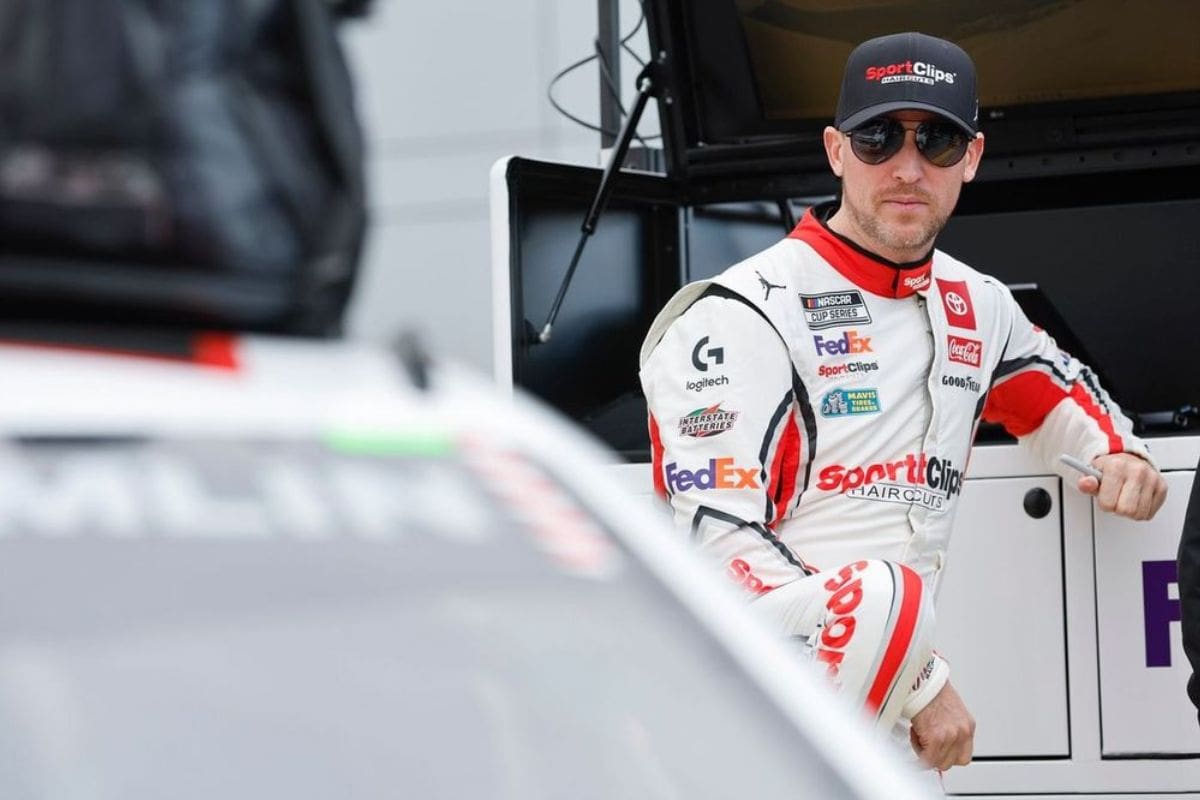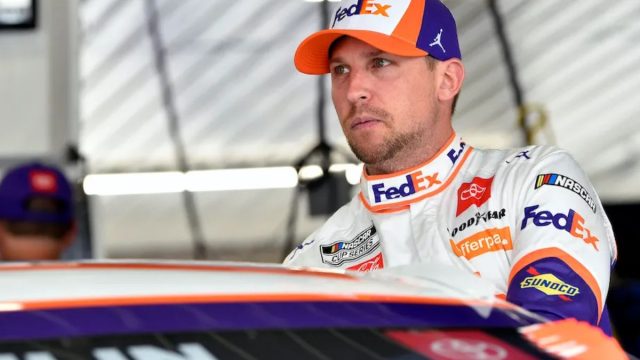Did Denny Hamlin’s Fame Affect NASCAR’s Decision: Denny Hamlin’s controversial victory at the Toyota Owners 400 highlights a intricate intersection of fame, strategy, and NASCAR’s regulatory decisions. Critics argue that Hamlin’s premature acceleration during a critical restart might have violated NASCAR rules, sparking debate over the consistency and fairness of the sport’s governance. While NASCAR’s decision not to penalize Hamlin has intensified discussions about potential favoritism towards prominent figures, it also reflects NASCAR’s broader strategy to navigate controversies to maintain interest and engagement. This incident emphasizes the ongoing challenges NASCAR faces in balancing integrity, popularity, and innovation. Further examination could reveal deeper insights into the dynamics of NASCAR’s decision-making processes.
Key Takeaways
- Hamlin’s high profile in NASCAR may have influenced public and media scrutiny of the controversial decision.
- NASCAR’s history of leveraging controversies could suggest that Hamlin’s fame made the incident more beneficial for engagement.
- The lack of penalty for Hamlin’s move raises questions about the consistency of rule enforcement, especially for well-known drivers.
- Hamlin’s outspoken persona and influence could potentially change NASCAR’s decision-making process to avoid backlash.
- The incident shows the complex relationship between athlete fame, sports governance, and the enforcement of rules in NASCAR.
Denny Hamlin’s Controversial Victory at Toyota Owners 400
Denny Hamlin’s victory at the Toyota Owners 400 has become a controversy due to allegations of an unfair advantage gained at an important restart. At the heart of the debate is whether Hamlin’s actions during the restart were within the NASCAR’s rules or if they were accused of unfair competitive advantage. Critics argue that Hamlin’s rapid acceleration before the official restart zone could have greatly impacted the race’s outcome, potentially skewing results in his favor. This incident has reignited discussions around the clarity and enforcement of NASCAR’s regulations regarding restarts, a critical aspect of racing that can drastically alter the course of competition.
Despite the rising accusations, NASCAR’s decision not to penalize Hamlin for the controversial move has added to the discourse. This ruling prompts a deeper analysis of the governing body’s criteria for judgment and its consistency in applying rules. In the absence of a penalty, there are implications not only for Hamlin’s record but also for the example it sets for future races. The decision raises questions about the balance between strict rule enforcement and the allowance for competitive tactics within the sport.
This controversy highlights the intricate dance between strategy, skill, and the rulebook in NASCAR racing. It emphasizes the challenges faced by officials in making real-time decisions that uphold the integrity of the sport while accommodating its inherently competitive nature. As the dust settles on the Toyota Owners 400, the debate over Hamlin’s restart and NASCAR’s ruling offers valuable insights into the complexities of motorsports governance and competition.

NASCAR’s Approach to Controversies and Popularity
In the face of decreasing viewership, NASCAR has increasingly found itself at the crossroads of harnessing controversies, such as the one surrounding Denny Hamlin, to enhance its popularity and engagement within the motorsports community. The strategy, while risky, treads the fine line between scandal and spectacle, aiming to recapture and expand its fanbase. This approach is part of a broader effort to revive NASCAR’s appeal, which includes embracing digital platforms and venturing into new, potentially profitable markets.
Negative publicity, paradoxically, often translates to increased visibility. The Hamlin controversy, for instance, has sparked discussions across various media, drawing both criticism and curiosity. Such heightened interest highlights the intricate relationship between controversy and viewer engagement in sports entertainment.
This analytical approach highlights NASCAR’s adaptive strategies in addressing its challenges. By balancing the immediate boosts from controversies with long-term investments in digital expansion, NASCAR aims to solidify its relevance in the rapidly evolving landscape of sports entertainment. The outcome of such strategies, while uncertain, is a reflection of NASCAR’s determination to innovate and thrive amidst adversity.
The Money Question: Did DH jump the restart? 💸
Listen to Actions Detrimental with @dennyhamlin now. 🎧
Apple: https://t.co/Yl28ppnC16
Spotify: https://t.co/2kcuDT2E9A
Web: https://t.co/MDirJW4o4T pic.twitter.com/xDxkZR9IrJ— Dirty Mo Media (@DirtyMoMedia) April 1, 2024
Denny Hamlin: The Controversial Figure in NASCAR
Throughout his career, Hamlin’s outspoken and fearless demeanor has consistently thrust him into the limelight, frequently sparking controversy and stirring debate within the NASCAR community. His willingness to voice opinions, even when they diverge from the prevailing sentiments in the racing world, sets him apart as a distinctive and polarizing figure. This trait, magnified by his podcast and public platforms, not only ignites discussions but also extends his influence and fan base beyond the confines of the racetrack.
Hamlin’s approach to freedom of speech, especially in a sport that values tradition and often conservative views, places him at the forefront of contemporary debates within NASCAR. His readiness to address controversial issues, whether related to the sport’s regulations, administration, or its culture, invites both admiration and criticism. This duality is symbolic of the complex relationship between individual athletes’ fame and the broader dynamics of sports governance and fandom.
Despite the controversies, Hamlin’s stature within the NASCAR Cup Series remains undiminished. His influence extends beyond his achievements on the track, shaping discussions around the sport’s future, its inclusivity, and its adaptation to changing societal norms. Posing as a key figure in NASCAR, Hamlin embodies the tensions between tradition and progress, between the individual’s voice and the collective identity of the sport.
Analyzing Hamlin’s impact offers insights into the evolving landscape of NASCAR, highlighting the intricate balance between maintaining disciplinary boundaries and embracing the transformative potential of prominent personalities.

Historical Precedents and Ambiguity
What happened at Richmond Raceway last Sunday bore a striking resemblance to a memorable incident at Charlotte Motor Speedway back in 2015. With just 10 laps remaining in the high-stakes $1 million Sprint All-Star Race, Brad Keselowski found himself leading the pack to pit road for mandatory four-tire pit stops.
Following Keselowski’s penalty for speeding, Denny Hamlin found himself in a prime position on the final restart, with Kurt Busch and Kevin Harvick hot on his tail, fiercely competing for the win. However, controversy erupted as Hamlin was accused of jumping the restart, swiftly seizing the lead and fending off the challenges from both drivers to secure a resounding victory.
To navigate this landscape, NASCAR may need to reassess its decision-making framework to enhance transparency and consistency. Establishing clearer guidelines for conduct and penalties, coupled with a more transparent jurisdiction process, could mitigate importance and reinforce trust in the sport’s governance. As NASCAR evolves, addressing these issues will be vital in maintaining the integrity of competition and ensuring that all participants are subject to an equitable and consistent set of rules.
“We’ll have to go to the tape to see if Denny went too soon. His car went two car lengths before (the line), in my mind. I was asleep at the wheel.” – (Busch)
“I thought I (went) right at the zone. Maybe right before, but they don’t measure it in inches. You have to be on your toes on that last restart.” – (Denny)

News in Brief
The scrutiny surrounding Denny Hamlin’s victory at the Toyota Owners 400 highlights the complex relationship between an athlete’s popularity and the governing body’s decision-making process.
NASCAR’s history of managing controversies, coupled with Hamlin’s prominence, emphasizes the challenges in maintaining fairness and integrity within the sport.
This incident serves as a case study in the potential influence of an athlete’s fame on regulatory decisions, emphasizing the need for transparent and consistent adjudication methods to uphold the sport’s credibility.
Our Reader’s Queries
Q: Has Denny Hamlin ever been a NASCAR champion?
A: Since the commencement of the 2019 season, no driver has secured more victories than Hamlin, boasting an impressive 20 wins in that timeframe. He leads the league ahead of Kyle Larson (18), Chase Elliott (15), Kevin Harvick (15), and Martin Truex Jr. (15). Notably, each of these drivers has clinched a championship, with the exception of Hamlin.
Q: What did Denny Hamlin do in NASCAR?
A: As a driver, Hamlin has triumphed in a total of 52 NASCAR Cup Series races, including notable wins such as the Coca-Cola 600 in 2022 and the Daytona 500 in 2016, 2019, and 2020. Remarkably, he joins esteemed company as the fourth individual to clinch victory in the Daytona 500 in consecutive seasons, alongside Richard Petty, Cale Yarborough, and Sterling Marlin.
Q: Is Denny Hamlin a Hall of Famer?
A: Denny Hamlin, a versatile presence in NASCAR, epitomizes the roles of entertainer, team owner, and potential NASCAR Hall of Famer. At 43 years old, he views himself not only as a competitor but also as a guardian of the sport. Hamlin’s previous thoughts about driver unionization highlight his commitment to the well-being of drivers in the sport.
Also Read: Did Denny Hamlin Admit Fault? Fans React to Twitter Tease

